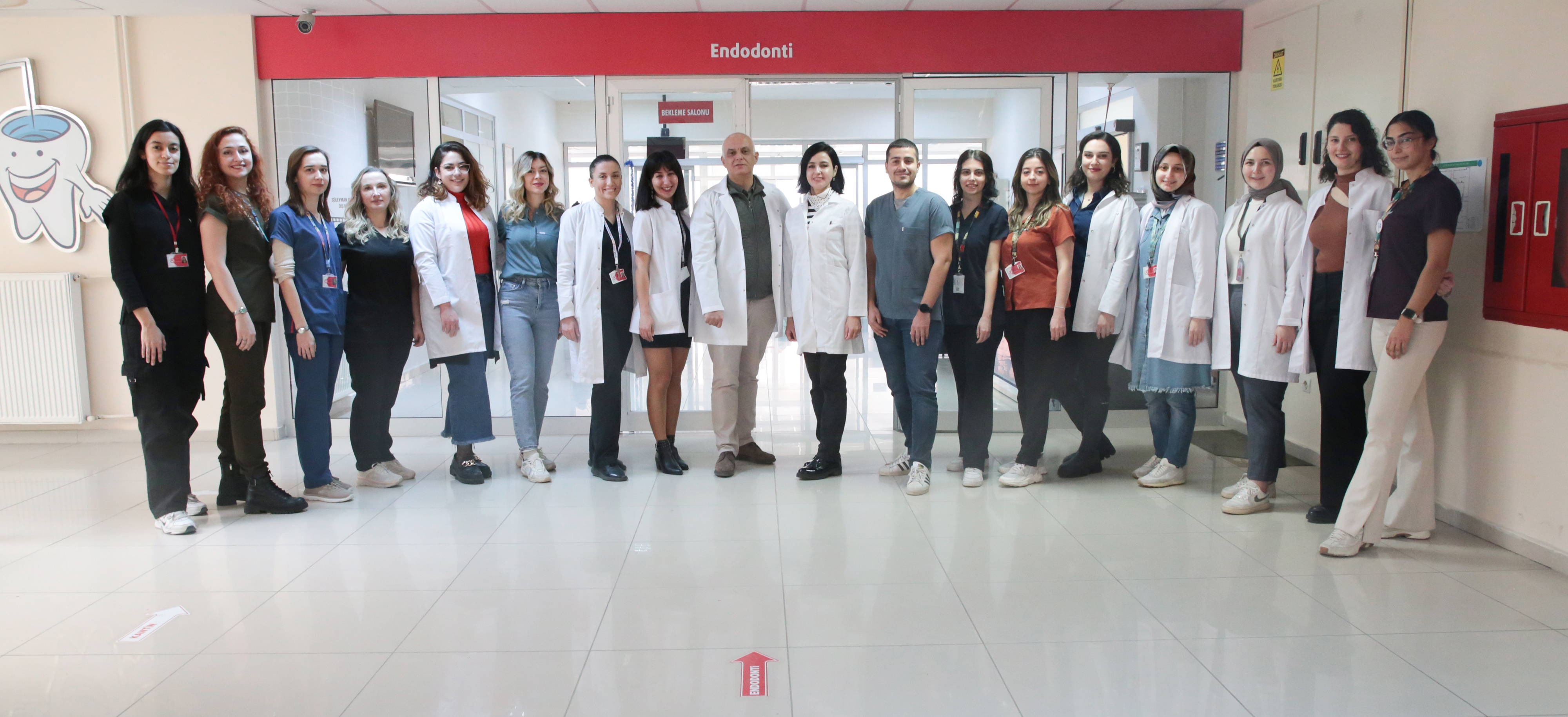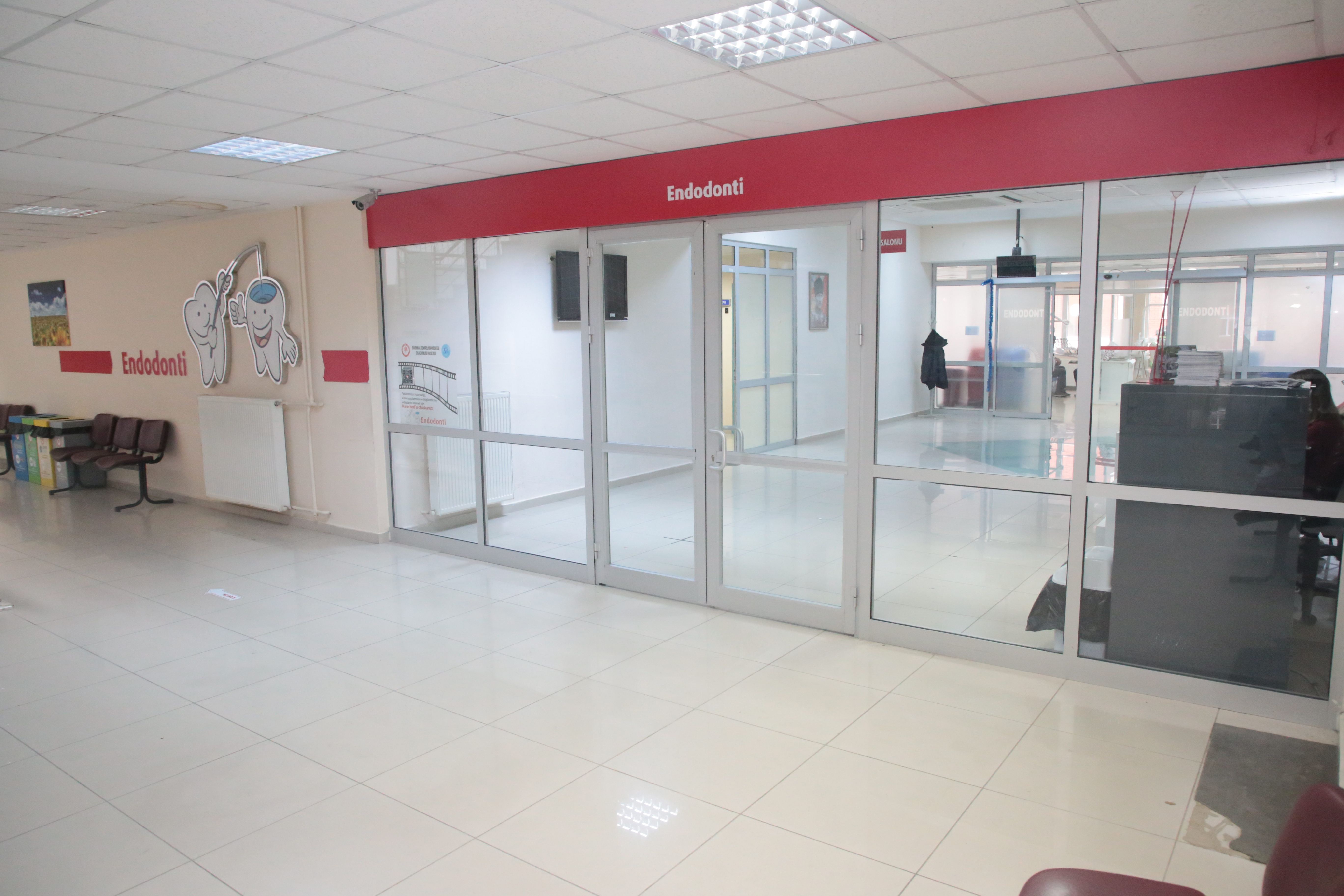Endodontics
|
Chair Assoc. Prof. Dr. Deniz YANIK NALBANTOĞLU Academic Staff
(0246) 211 33 51 |
HISTORY Endodontics, which provided education, training and service in the Department of Dental Diseases and Treatment in 1995, became a Department in 2006. In our department, many doctoral and specialization theses have been completed so far.
LOCATION AND CAPACITY Our department provides service with a total of 23 dental units in 3 clinics, including a faculty member clinic, a research assistant clinic and a trainee clinic.
RESEARCH ASSISTANT TRAINING PROCESS The duration of doctoral education is 4 years. During this period, doctoral students take the first two years of doctoral courses theoretically and practically. Students who pass the proficiency exam at the end of 2 years continue their thesis studies. The duration of specialization training is 3 years. While the theoretical and practical courses are completed in two years, a period of three years is foreseen for the preparation of the thesis. In addition, rotation is carried out for a period of 1 month in the Department of Oral and Maxillofacial Surgery. Case presentations and article hours are held on Thursdays every week.
DEPARTMENT OF STUDY AREAS Treatment of deep caries very close to the nerves of the tooth (vital treatments) Emergency Treatment: Symptomatic treatment of teeth with night pain and severe pain Renewal of poorly performed root canal treatments. Root canal treatment applications (Canal treatments are performed under rubber dam protection) Root canal treatment under general anesthesia or sedation in the inpatient service of our faculty Restoration of severely damaged or rooted teeth with metal or fiber posts Removal of broken canal instruments in the root of the tooth. Restoration of broken teeth Treatment of traumatized teeth such as accident, fall, impact. Apical resection treatments (Filling the area with a tissue compatible material after surgical removal of the inflammation at the root tip of the teeth) Vital and devital whitening treatments (Bleaching of vital or root canal treated teeth)
OPPORTUNITIES Dental operating microscope and microscope room Digital radiography system and radiography room 3 clinics 23 dental units Rotating systems, light devices in each unit
Frequently Asked Questions About Endodontics What is endodontics? Endodontics is a brach that deals with the treatment of root canals in teeth. Under the enamel and dentin layers of the tooth, there is a section called the "pulp", which extends to the end of the tooth roots, and consists of vessels and nerves that provide the vitality of the tooth. If this part becomes inflamed for any reason such as bruises or fractures, this part should be cleaned, disinfected and filled with various chemicals. This treatment is called root canal treatment.
Is root canal treatment a long-term treatment? How many times do I have to come? How many sessions of root canal treatment will take depends on the condition of the tooth. Root canal treatment can be performed in a single (1) session for non-inflamed teeth. The number of sessions may increase in teeth that are inflamed, very painful and have any problem that will prolong the treatment period. 1 session may require more work. Sessions last between 15-45 minutes. The second and subsequent sessions are usually shorter.
What happens if root canal treatment is not done? In cases where root canal treatment is required but not performed; Severe toothache is the most common condition. After a while, the pain can be relieved as the pulp loses its vitality. However, in this case, the infection may progress without causing any pain and cause inflammation in the bone tissue around the tooth root. Such a situation may reduce the chance of success of root canal treatment as well as delay healing.
Why can't I have my tooth extracted? Some of our patients think that it would be better if I had my tooth pulled out instead of root canal treatment, instead of a bridge or implant. No prosthesis can replace your own teeth. Do not have your tooth extracted unless a specialist in the field of endodontics deems it appropriate to have your tooth extracted.
Can the root canal treatment of more than one tooth be finished in the same session? Root canal treatment is a laborious treatment that usually requires at least one session for a tooth. Especially in molars at the back of your mouth, only one tooth can be treated in one session. However, if your doctor deems it appropriate, root canal treatment can be applied to more than one tooth in the same session in adjacent incisors in the anterior region that need root canal treatment.
Will I feel discomfort during the treatment? Will I have pain? Will my pain go away immediately? Local anesthesia is applied during the treatment. For this reason, treatments are carried out largely without discomfort or pain. In very rare cases, mild pain may be felt. After the root canal treatment, there may be a bearable pain in the tooth for a few days or a slight sensitivity when pressing on the tooth. This is a normal pain that occurs after root canal treatment.
Do I need to use medication after treatment? Only follow your doctor's advice on drug use.
How long after treatment can I eat and drink? Under normal circumstances, it is recommended not to chew anything after root canal treatment until the effect of anesthesia wears off, that is, until the numbness disappears. Because there is a risk of biting your lip, cheek or tongue that is numbed with the tooth. In addition, the type of filling material applied to your teeth is also important. In temporary fillings, it is generally recommended that you do not eat or drink anything for at least 2 hours. If you have amalgam filling in your tooth, it is recommended that you do not chew for 2 hours in the same way. You can have a drink when necessary.
How long is the life of the tooth treated with root canal? Root canal treatment is a treatment to prevent tooth extraction. As a result of a root canal treatment performed under appropriate conditions, the tooth can function in the mouth for a lifetime.
What is the success rate of root canal treatment? What happens to that tooth after unsuccessful treatments? Root canal treatment success may not always be 100%. It is possible to achieve a very high rate of success, but treatment may not be successful in common and resistant infections. In addition, root canal treatments that are unsuccessful or not performed under appropriate conditions have a chance to be renewed, and the success of the renewal treatment is quite high.
Informed Consent Forms CAPPING INFORMED CONSENT DOCUMENT EMERGENCY DENTAL TRAUMA TREATMENTS INFORMED CONSENT DOCUMENT ENDODONTICS INFORMED CONSENT DOCUMENT REGENERATIVE TREATMENT INFORMED CONSENT DOCUMENT INFORMED CONSENT DOCUMENT FOR REMOVING A BROKEN TOOL RETREATMENT (RENEWAL OF ROOT TREATMENT) INFORMED CONSENT DOCUMENT |

